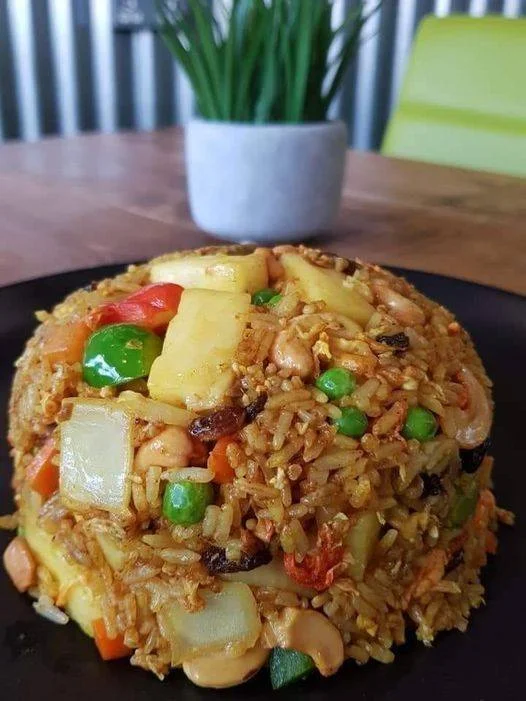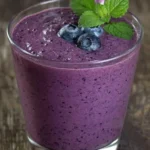In a world where dietary preferences are as diverse as the cultures they stem from, veganism emerges as a choice that not only embraces compassion towards animals but also champions sustainability and health. Within the realm of vegan cuisine, the marriage of flavors and textures often takes center stage, crafting dishes that not only tantalize the taste buds but also nourish the body and soul. Enter the aromatic symphony of Vegan Pineapple Fried Rice, a dish that transcends cultural boundaries to become a beloved staple on tables around the globe.
Picture yourself amidst the bustling streets of Bangkok, where the air is heavy with the scent of exotic spices and the sizzle of street food vendors’ woks. It’s here that the origins of Vegan Pineapple Fried Rice can be traced back, to a bustling marketplace where vendors deftly stir-fry rice, vegetables, and fruits in a harmonious dance of flavors. This dish, once a humble street food delight, has since evolved into a culinary icon, cherished for its vibrant colors, bold flavors, and versatility.
At its core, Vegan Pineapple Fried Rice embodies the essence of Thai cuisine—balance. Each bite is a delicate interplay of sweet, savory, and tangy notes, orchestrated with precision to create a symphony of flavors that dance on the palate. The marriage of juicy pineapple chunks, tender vegetables, and fragrant jasmine rice creates a harmony that is as satisfying to the senses as it is to the soul.
But Vegan Pineapple Fried Rice is more than just a delicious meal; it’s a celebration of nature’s bounty. In every vibrant bite, the colors of the rainbow come alive, courtesy of an array of fresh vegetables like crunchy bell peppers, crisp snow peas, and earthy carrots. These ingredients not only add visual appeal but also pack a nutritional punch, ensuring that every mouthful is as wholesome as it is delicious.
What truly sets Vegan Pineapple Fried Rice apart is its ability to transcend cultural boundaries and adapt to diverse culinary preferences. Whether enjoyed as a standalone dish or paired with other Thai favorites like tofu satay or green papaya salad, it has a universal appeal that knows no bounds. From the bustling streets of Bangkok to the cozy kitchens of home cooks around the world, Vegan Pineapple Fried Rice has cemented its status as a beloved classic.
In essence, Vegan Pineapple Fried Rice is more than just a dish—it’s a testament to the power of food to unite, inspire, and nourish both body and soul. With each forkful, it invites us to embark on a culinary journey that celebrates the beauty of plant-based eating while paying homage to the rich tapestry of global flavors. So, whether you’re a seasoned vegan or simply seeking a flavorful adventure, let Vegan Pineapple Fried Rice be your guide to a world of delicious possibilities.
Here is some Important tips:
Gut Health:
Plant-based diets are often associated with improved gut health due to the high fiber content from fruits, vegetables, and whole grains. A healthy gut microbiome is linked to better digestion and overall well-being.
Anti-Inflammatory Properties:
Many plant-based foods have anti-inflammatory properties, which can help in reducing inflammation in the body. Chronic inflammation is associated with various health issues, and a vegan diet may contribute to its prevention.
Sports Performance:
Contrary to the misconception that vegan diets lack protein, many successful athletes follow plant-based diets to enhance their performance. Plant-based proteins can support muscle building and recovery.
Reduced Risk of Foodborne Illnesses:
Plant-based diets eliminate the risk of foodborne illnesses associated with the consumption of undercooked or contaminated animal products.
Economic Impact:
A vegan diet can be more economical as plant-based protein sources tend to be cost-effective compared to some animal products. It may be a budget-friendly option for individuals or families.
Mindful Eating:
Adopting a vegan lifestyle often promotes mindful eating. Being more conscious of food choices and sources can lead to a healthier relationship with food and a greater appreciation for the environmental impact of dietary decisions.
Preservation of Biodiversity:
The expansion of animal agriculture often leads to habitat destruction and loss of biodiversity. Choosing a vegan diet supports the preservation of ecosystems and the protection of various species.
Culinary Diversity:
Veganism introduces individuals to a diverse range of cuisines and ingredients from around the world. Exploring plant-based cooking can be a culinary adventure, embracing flavors and techniques from different cultures.
Reduced Antibiotic Resistance:
The use of antibiotics in animal farming contributes to the rise of antibiotic-resistant bacteria. Opting for a vegan diet can be a way to reduce the demand for such practices and promote responsible antibiotic use.
Cruelty-Free Beauty and Personal Care:
Veganism extends to beauty and personal care products. Choosing cruelty-free, vegan alternatives ensures that your lifestyle aligns with ethical choices beyond just dietary preferences.
Vegan Pineapple Fried Rice

Ingredients:
2 cups cooked jasmine rice (preferably chilled)
1 cup pineapple chunks (fresh or canned)
1 cup mixed vegetables (peas, carrots, bell peppers, etc.)
1/2 cup diced tofu or tempeh (optional)
3 tablespoons soy sauce or tamari
1 tablespoon vegetable oil (such as sesame or coconut oil)
1 small onion, finely chopped
3 cloves garlic, minced
1 teaspoon curry powder (adjust to taste)
1/2 teaspoon turmeric powder
Salt and pepper to taste
Chopped green onions and cilantro for garnish
Lime wedges for serving
Instructions:
If you’re using tofu or tempeh, start by marinating them in a mixture of soy sauce and a pinch of turmeric for flavor and color. Set aside for a few minutes.
In a large skillet or wok, heat the vegetable oil over medium-high heat.
Add the marinated tofu or tempeh to the skillet and cook until golden and slightly crispy. Remove from the skillet and set aside.
In the same skillet, add the chopped onion and sauté until translucent.
Add the minced garlic and cook for another 30 seconds until fragrant.
Push the onion and garlic to one side of the skillet and add the cooked rice to the other side. Allow the rice to heat up and lightly toast for a few minutes.
Stir in the mixed vegetables and pineapple chunks. Cook for a few minutes until the vegetables are tender.
Add the curry powder, turmeric powder, soy sauce or tamari, salt, and pepper. Mix everything together to evenly distribute the flavors and colors.
Gently fold in the cooked tofu or tempeh, if using.
Taste the fried rice and adjust the seasonings as needed.
Once everything is well combined and heated through, remove the skillet from the heat.
Serve the Vegan Pineapple Fried Rice in bowls, garnished with chopped green onions, cilantro, and lime wedges for an extra burst of flavor.
Nutrition Facts:
Servings: 3 servings
Serving Size: 1/3 of the recipe
Per Serving:
Calories: ~330
Total Fat: ~6g
Saturated Fat: ~1g
Cholesterol: 0mg
Sodium: ~650mg
Total Carbohydrates: ~62g
Dietary Fiber: ~5g
Sugars: ~15g
Protein: ~8g


